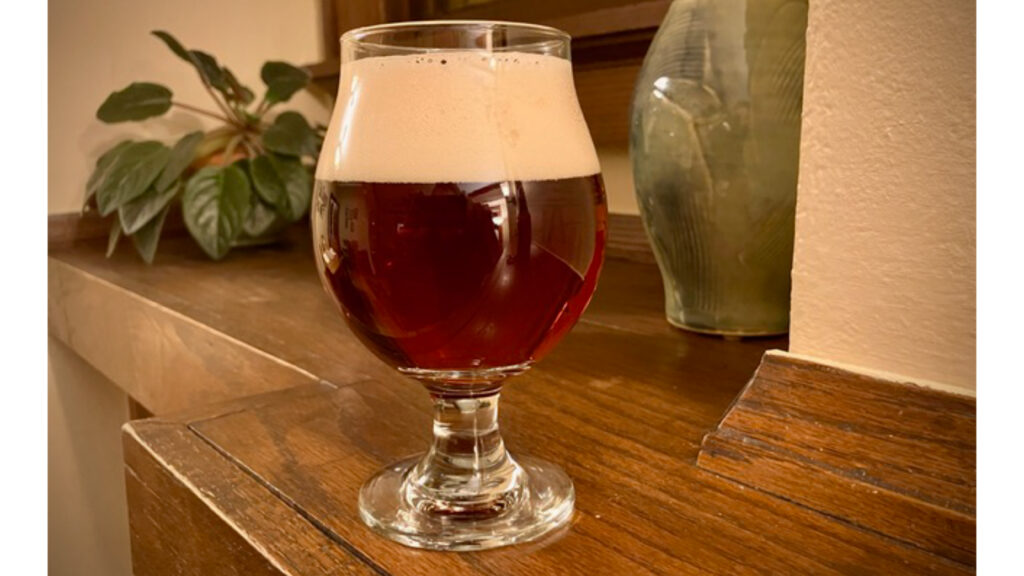
The recipe (and brewer’s notes) for this rare traditional German beer style was provided by Jeff Enders who was awarded Best of Show Honorable Mention at the 2023 Deja Bru Homebrew Competition, the topic of this Chop & Brew episode. The beer took first place in the Sticks and Stones category before advancing to the Best of Show table. All notes are Jeff’s. Be sure to read them thoroughly for modifications if you plan to brew your own version.
Braunschweiger Mumme (1831) Homebrew Recipe
Target Original Gravity = 1.101
Actual Original Gravity = 1.084
Target Final Gravity = 1.037
Actual Final Gravity = 1.016
8.9% ABV
22 IBU
Ingredients
- 67% Dark wheat malt (Weyermann Dark Wheat Malt 7L)
- 33% Munich malt (Weyermann Barke Munich Malt 8L)
- 1.5 oz Hallertau Mittelfruh 3.75% AA (shoot for about 22 IBUs)
- 0.7 oz (21 g) juniper berries
- 0.06 oz (2 g) marjoram
- 0.06 oz (2 g) thyme
- 0.03 oz (1 g) dried elderflowers
- 0.57 oz (17 g) plums [I used 3.5 oz (100 g) of plums]
- 2 packages of LalBrew Windsor British-style beer yeast
Brewer’s Notes
I got the recipe from the book Historic German and Austrian Beers for the Home Brewer by Andreas Krennmair. He self published the book, and I bought the book through his website. If you google the title plus “PDF” there are links for downloading a free electronic version of the book, a pandemic present from the author.
A couple of times a year I brew with a friend who is an archeology professor at UW-Milwaukee. When I told her about Deja Bru and that I was thinking about brewing a Mumme or possibly another beer from the book, she got all excited and said brew the Mumme. So we did, and I’m glad we did. I will definitely brew it again. A lot of the beers documented in the book just sound like regular beers, but the Mumme is unique.
This is a big beer and I was shooting for 3.5 gallons at 1.100. My efficiency was terrible and I got 3 gallons at 1.084. But my yeast was a little more efficient and I reached the 8.9% ABV the recipe called for. Outside of the efficiency error, everything else went very smoothly and I’m really happy with the beer. I will definitely brew it again. I did a step mash because the Barke Munich malt is fairly under-modified. Mash steps at 115F, 125F and 144F, plus a mash out. I rarely step mash so my mash was kind of sloppy, which may be why my efficiency was so poor. The book’s recipe is for 2.5 gallons of finished beer and I was shooting for 3 gallons of finished beer, which I got. His recipe called for 9 lbs of dark wheat malt and 4.5 lbs of Munich malt (13.5 lbs total), whereas I used 12 lbs of wheat and 6 lbs of Munich (18 lbs total). But his recipe didn’t state a boil duration, it just says “Boil wort until it has reduced to about 2.5 gallons”. So, you can see that my efficiency was a lot different from the authors.
The book suggested a low-attenuating, top-fermenting yeast like SafBrew S-33, a yeast I find rather bland, so I used the Windsor yeast, also low-attenuating. The majority of the fermentation was done within 3 days, but I let it sit on the yeast for 7 days before I cold crashed.
Herb & Fruit preparation: Per the book – “Add hops, juniper berries, marjoram, thyme, elderflowers and plum to 1 liter of almost boiling water. Strain after 10 hours to get extract. Add extract to wort at pitching.” I strayed from the recipe and added hops at the start of the 90 minute boil. 90 minute boil with hops for the full boil.
Chill to 65F and pitch yeast and herb/fruit extract.
I kegged and force-carbonated, and then counter-pressure bottled.
It must have been a challenge judging with all the obscure beer styles. I’ve been judging since 2005 and I organized the Wisconsin State Fair competition for several years, but I never got to work on a competition quite like this one. I hope they have it again next year.
